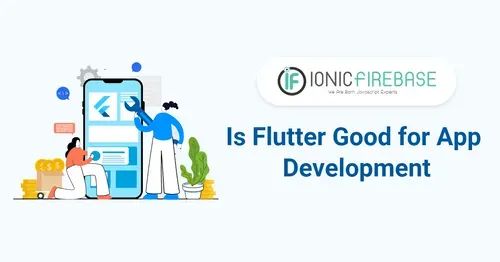Is Flutter Right For Your Project? Pros and Cons Explained

Is Flutter Right For Your Project? Pros and Cons Explained
Flutter is a popular mobile app development framework that allows developers to create high-performance cross-platform apps quickly and easily. With its ability to reduce the amount of code needed and the speed with which it works, it’s no wonder why many developers are turning to Flutter for their projects. But is it the right choice for you? Here we’ll explore some of the pros and cons of using Flutter so you can make an informed decision.
Pros of Using Flutter
1. Hot Reloading - One of the biggest advantages of using Flutter is its hot reload feature, which allows developers to make changes to their code and see those changes reflected in real time on the device or simulator they are testing on. This means that developers can iterate quickly and test changes with ease without having to wait for a build process each time they want to view their changes.
2. Easy To Learn - If you’re familiar with JavaScript or any other object-oriented language, you’ll find learning how to use Flutter relatively easy. It also uses Dart, a relatively simple language, which makes writing code much easier than other frameworks like React Native or Ionic. Even if you don't have experience in programming languages, there are plenty of tutorials available online. You can watch video lessons from the Google team, and go through practical exercises on Codelabs. So you can learn how to get started with Flutter quickly.
Also Read: Top Flutter App Development Companies in 2023
3. Widgets - Widgets are at the core of what makes Flutter so powerful as a framework. They allow developers to quickly create beautiful user interfaces without having to write long blocks of code for each element they want to display on the screen. Additionally, flutter widgets are also very customizable, allowing developers to customize them according to their project's needs with relative ease.
4. Open Source - Another major advantage of using Flutter is that it is open-source software released under the Apache 2 license, which means that anyone can use it for free without having to worry about licensing fees or royalties. Additionally, since it is an open source project, there's a wide community behind it who regularly contribute bug fixes and improvements as well as offer support when needed.
Cons Of Using Flutter
1. Limited Libraries & Plugins - Although there are some libraries available for use with Flutter (like Firebase), the number pales in comparison when compared with other mobile app development frameworks such as React Native or Ionic which offer more plugins and libraries out-of-the-box making certain tasks easier such as authentication or sending push notifications, etc. This could be a major drawback if your project requires extensive library support from third parties as you would need to spend extra time finding compatible libraries or writing custom ones from scratch if none exist already.
2. Limited Accessibility Options - Although recent updates have added better accessibility features for users who rely on screen readers or voice input commands in order to navigate through applications made with Flutter, there still remains room for improvement when compared with other mobile application development frameworks such as React Native which offers more builtin accessibility options out-of-the-box. This could be an issue if your project requires extensive accessibility support from third parties.
3. Poor Performance On Low-End Devices - While performance might not be an issue on newer devices running modern operating systems, older devices running older versions may suffer due to poor performance due lack of hardware resources available. This could cause issues such as slow loading times, laggy animations, etc., resulting in a poor user experience overall.
The Best Mobile Apps Made With Flutter
Flutter is quickly becoming a popular platform for application development, due to its unique features and capabilities. Flutter apps are known for their smooth performance, responsive designs, and fast loading speeds. They are also easy to develop and customize, making them ideal for creating unique experiences that stand out from the crowd. Here are some of the best Flutter apps that have been made so far.
-
Hamilton App: Developed by Flutter fans, the Hamilton App is a great example of Flutter’s functionality. This app has an amazing user interface and some awesome features such as real-time updates and offline support. The app also offers seamless integration with other services like Google Maps, making it one of the most comprehensive Flutter apps ever created.
-
Flappy Bird: Flappy Bird is an addictive game that was originally developed for Android but has now been ported to Flutter for iOS and other platforms. The game offers a great user experience with its smooth animations, responsive controls, and vibrant visuals. Flutter’s capabilities have allowed Flappy Bird to remain one of the most popular Flutter apps around.
-
Coach: Coach is an app that helps people stay organized by setting goals and tracking progress, all without having to use multiple different solutions. The app utilizes Flutter’s streamlined development process to quickly create a feature
Top 20 Flutter Apps: Amazing Mobile Apps made with Flutter framework Examples
Will Flutter replace React Native and Xamarin?
Currently, Flutter is not a direct replacement for React Native or Xamarin. While Flutter shares some similarities with React Native and Xamarin, there are key differences that set it apart. For instance, Flutter uses its own programming language called Dart which is relatively new compared to JavaScript used by React Native and C# used by Xamarin. Additionally, Flutter is not as mature as React Native or Xamarin, which means it may require more work to be successful in production environments. Ultimately, the choice between Flutter, React Native and Xamarin depends on your specific needs and requirements. If you need a platform that supports multiple programming languages, then you may be better suited to React Native or Xamarin. However, if you're looking for a platform that offers fast development cycles and a modern UI, then Flutter may be the best choice for you.
Conclusion: Overall, while there are both pros and cons associated with using flutter, whether or not it's right for your project will largely depend upon what kind of features/functionality your application requires. If your application requires extensive accessibility options or library support then perhaps choosing another mobile app development framework might be a better option. However, if the features/functionality required by your application can be easily done using Flutter native capabilities then this popular framework could be just what you're looking for! In any case, doing proper research beforehand will help ensure that you make an informed decision when deciding whether fluter should be used in your next project!


